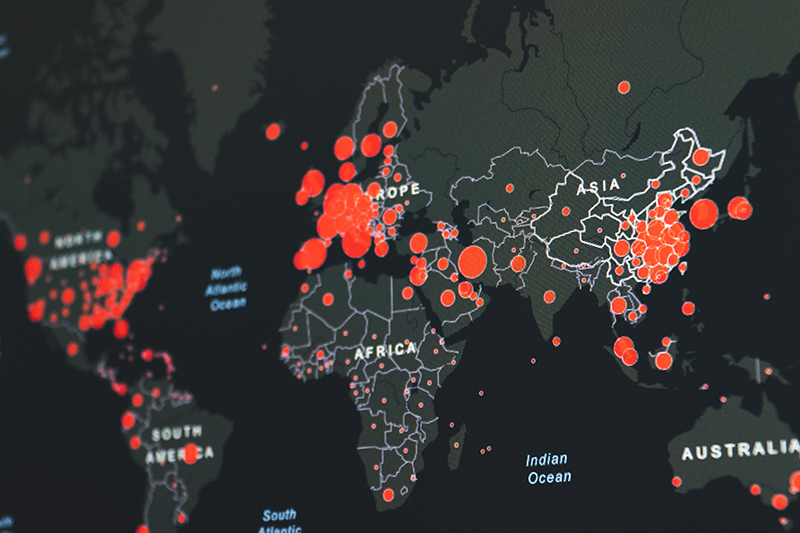In face of the worst and most serious global public health threat humanity has seen since the 1918/19 influenza pandemic, research around COVID-19 gives the example of an unprecedented scale of openness and sharing with new perspectives in terms of speed of delivery, quantity and quality of results. An article in Science entitled “Coronavirus outbreak changes how scientists communicate” triggered our interest to identify such tangible signs as an invitation to reflect on the way we do research.

Launched in March 2020, the COVID-19 Open Research Dataset (CORD-19), is a resource of over 29,000 scholarly articles, including over 13,000 with full text, from peer-reviewed journals as well as repositories like bioRxiv and medRxiv. The research covers SARS-CoV-2, COVID-19, and the coronavirus group. The CORD-19 dataset represents the most extensive machine-readable coronavirus literature collection available for data mining to date. Updated in real time as more research is released, the approach helps facing the rapid acceleration in new coronavirus literature, making it easier for the medical research community to keep up.
This freely available dataset is an initiative from US state and private actors such as Microsoft which “used its literature curation algorithms to find relevant articles and research”, while “nonprofit Allen Institute for Artificial Intelligence (AI2) converted them from web pages and PDFs into a structured format that can be processed by algorithms”. The database is provided to the global research community to apply recent advances in natural language processing and other AI techniques to generate new insights. Stemming from this is the COVID-19 Open Research Dataset Challenge, a call to action to the world’s artificial intelligence experts to develop text and data mining tools that can help the medical community develop answers to high priority scientific questions.
Earlier on, in February 2020, the research-charity Wellcome Trust, called for researchers, journals, scientific societies and funders around the world to ensure the rapid sharing of research data and findings relevant to the coronavirus. In the signed statement, they commit to:
- Working together to help ensure that all peer-reviewed research publications relevant to the outbreak are made immediately open access, or freely available at least for the duration of the outbreak
- Research findings relevant to the outbreak are shared immediately with the World Health Organization (WHO) upon journal submission, by the journal and with author knowledge
- Research findings are made available via preprint servers before journal publication, or via platforms that make papers openly accessible before peer review, with clear statements regarding the availability of underlying data
- Researchers share interim and final research data relating to the outbreak, together with protocols and standards used to collect the data, as rapidly and widely as possible — including with the public.
As a result, resources on coronavirus disease (COVID-19) from editors such as The Lancet, PLOS, Springer Nature and many others, bring content from across their journals free of access. Actually, in this turmoil, scientists are sharing more information using preprints than they did during any previous outbreak. The number of published papers is exploding as well, with publishing rates at record speeds. As of 12 March there had been around 900 papers, preprints and preliminary reports related to coronavirus says a Nature article entitled “The coronavirus pandemic in five powerful charts”.
Another example comes from WHO which is gathering the latest scientific findings and knowledge on coronavirus disease (COVID-19) and compiling it in a database. The database is updated daily from searches of bibliographic databases, hand searches of the table of contents of relevant journals, and the addition of other relevant scientific articles, though entries may not be exhaustive.
An article published in Horizon highlights how the exceptional collaboration between researchers helped achieve the publication of the entire SARS-CoV-2 virus genetic makeup within days, allowing scientists to trace and monitor the COVID-19 pandemic faster than any previous outbreak (see the different response to SARS or COVID-19 outbreaks illustrated in the coronavirus timeline).
Finally, a most exciting initiative has very recently seen the light aiming to redirect scientific resources towards the fight against COVID-19. The Crowdfightcovid19.org platform targets two types of scientists:
- Scientists at all levels of their career, even if they work in fields completely unrelated to COVID-19, which simply need to sign up as volunteers, so that they can be reached if their help is needed, e.g. answering a question related to their discipline to something more complex.
- Researchers who are already working on COVID-19: they can ask the scientists volunteers to perform any task for them, for free. These tasks can include labor intensive tasks (annotating data, analyzing images manually, etc.), answering questions (from simple questions about a protocol, for example, to general research questions), or setting up new techniques for them. Everything is coordinated by scientists highly skilled in the field of interest, so the input needed from them is kept to a minimum.
The platform has already gathered more than 32’000 researchers volunteers ready to help.
The impact of this tremendous rally cannot yet be fully estimated, but it is certainly comforting to see the alliance of all involved parties to bring this outbreak to a close, if not the rise of a new culture of doing research.
We’d love to hear your thoughts and inspiration! Do you have other innovative examples of research collaboration around COVID-19 worth sharing in the comments?
Cover picture (fist): Photo by Branimir Balogović on Unsplash

Leave a comment
The editors reserve the right not to publish comments or to abridge them.